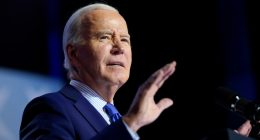
December’s 7% rise in annual inflation capped a year of soaring prices—the fastest pace in nearly 40 years.
That astonishing acceleration—one few economists had predicted this time last year—was driven by imbalances in supply and demand stoked by the Covid-19 pandemic and related policy responses, along with a run up of energy prices.
Here is a look at how prices climbed in 2021:
A shortage of semiconductor chips and Covid-19-related manufacturing shutdowns crimped auto production, winnowing the supply of new autos.
Meanwhile, consumer demand boomed and rental-car companies bought up used cars to rebuild their fleets, sending prices for used autos up 45.2% in June 2021—the most since records began in 1953.
Used-auto prices have cooled only slightly, rising at a still staggering rate of 37.3% in December. New-vehicle prices climbed 11.8% last month, the sharpest pace since 1975.
Surging gasoline prices added to the high costs of getting around in 2021. Pump prices bounced back last year in a big way as vaccinations spread and the economy more fully reopened, following a plummet in demand in the early months of the pandemic.
The 58.1% increase in November from a year earlier was the sharpest since 1980. Economists generally expect some of these gains to reverse this year, taking pressure off overall inflation.
Prices for furniture and outdoor-recreation equipment spiraled upward 2021 as a result of supply shortages and booming demand for home improvement and socially-distant recreation.
Throughout the pandemic, prices for services that involve in-person contact or mingling in crowds have tended to swing with the trend in Covid-19 cases.
After plunging in the first year of the pandemic, prices for airline fares and hotels staged a big recovery in the first half of 2021 as vaccination and eased restrictions encouraged travel.
By July, hotel prices were well above where they were in February 2020. However, the outbreak of the Delta variant reversed these gains.
Prices for restaurant meals began climbing sharply in the spring as dining demand returned and shortages of material and labor emerged. By the end of the year, they reached their fastest pace since 1982.
The steady rise in dining prices—particularly, those for fast food—reflects increased wage costs putting pressure on product prices, economists say.
Average hourly wages for nonmanager workers in leisure and hospitality jumped sharply throughout 2021, rising at a 15.8% pace by year-end.
Groceries prices also ate into consumer budgets as 2021 wore on. Prices for store-bought food shot up at the fastest clip since 2008, while those for beef and pork rose at close to two and three times that rate.
Rent gains slowed early in the first year of the pandemic as people stayed put, moved in with family or bought a home of their own. However, rental costs rebounded in 2021, with rents for tenants up 3.3% in December.
Meanwhile, owners’ equivalent rents—the Labor Department’s estimate of what homeowners would have to pay each month if they were renting their own home—climbed to 3.8%. Economists expect gains for both to accelerate in 2022, creating new inflationary pressures as those created by supply-chain constraints ease.
Write to Gwynn Guilford at [email protected]
Copyright ©2022 Dow Jones & Company, Inc. All Rights Reserved. 87990cbe856818d5eddac44c7b1cdeb8








